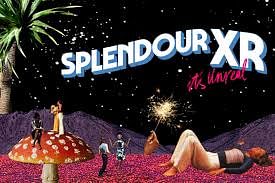
Let's start with the fact that I am now, despite all my best efforts, kind of a grump. The truth is that I've always been. I require a specific set of circumstances to be a cheery participant, in most cases.
At shows past, I've always been the "mean-mugger," lining the walls with the other MMs, arms folded, quietly vibing and judging. It's a look. You'd never know I was having a good time. Get a few drinks in me and I'll maybe do a little shuffling at your dance party, but at shows proper, I'm the tuff discerning guy. Tough but sensitive. Tough but fair.

When given the opportunity to go to a virtual Australian music festival, I wouldn't say I jumped at the chance. My decision arrived after some mental gymnastics: Is it even going to be worth it if I can't hear it live? Do I even go to real shows anymore? How late does it start? Is it going to be a bunch of bands I've never heard of? My neck hurts. I'm tired. I'm hungry. OLD.
SplendourXR is, according to their site,
"the global premiere of the digital, interactive world of Australia’s favourite music and arts festival Splendour in the Grass.
In a world first, we will be presenting a virtual Splendour in the Grass event, combining ground-breaking technology, immersive experiences and audience engagement never seen before. All your favourite Splendour in the Grass stages and venues will be available showcasing new and unseen content exclusively for XR.
In this digital world, you can create or select your avatar and move around a virtual Splendour in the Grass site. Watch exclusive artist performances and content while connecting with friends and audiences from around the globe. Splendour XR is a ticketed event, with single day or weekend 2 day tickets available."

My red flags were already erect upon seeing all those extra "u"s in their promo text, with musical acts being described as "content." Nothing gets my blood to thickening like the idea of "content" when in a virtual/digital context. It reeks of social media narcissisms and the whole boiling well of feelings I get about internet culture. OLD. Still, it's not like I had anything better to do with my weekend. I'm currently on a no-booze, low-carb diet, so actual IRL fun hasn't been an option for a few weeks. This festival, held in Australia time, meant I'd have to either stay up until the wee morning hours, or get up early. I got up early.
In “The Precession of Simulacra,” Jean Baudrillard laments the loss of reality in the era of postmodernism. He sees that the relationship between what we consider the “real” and the “copy” has, over centuries, been subverted by those in power, rendering what is actually real untrue and that everything that used to have actual meaning has been replaced by a virtual meaning. As simulation has become more and more realistic, reality has been replaced by simulation.
Baudrillard defines this relationship, the simulation, as “the generation by models of a real without origin or reality: a hyperreal.” This should not be confused with representation, the innate connection between a concept and its abstraction, for that signifies two, very real referential points (i.e. the concept and its successive abstraction). Simulation, on the other hand, threatens the very existence of the real in that it seeks infinite modular reproductions—an endless distribution of copies via the function of signs, the simulacra.

At SplendourXR, bands have pre-recorded their performances for this live audience of folks dialing in virtually (via VR, gaming PC, or web/mobile streaming) to attend the festival. With browser streaming, I was only able to view the acts through various camera angles and world "rooms," and the only interaction existed in the chat function of the screen parameters, similar to a Zoom session. Le sigh. I do miss the body odor, bad and good, of a packed venue. I even miss having to stand on my toes to see the stage. I'm a sick girl.
I got up at 5:00 am on Saturday to the sensation of a hungry cat digging her claws into my ribs, so that felt like a great time to feed the little goblin and check out some of the acts in the lineup.
I was a little shocked at how nice it was to put on my noise-cancelling headphones and grump to Vera Blue, Australian singer-songwriter.

Vera Blue has the ::ethereal swooshing:: pop singles down to a T. This first song. When I tell you I stood up off my couch and swayed my tired old body in the dark...
Dammit they got me in the first scene of the first act! Getting soft in my old age.
Under a Baudrillardian lens, one might criticize the event as a pale imitation, a grotesquely constructed, hyperreal facsimile of the classic musical festival. But the perspective to keep in mind is that any music festival (hell, anything at all) is a reproduction of some previous endeavor that was way richer and better for some other grump. The Mona Lisa is no longer an original piece of art; it's gone through so many restorations that it's now a painting of itself, a copy of itself. The Mona Lisa no longer represents anything except the painting of the Mona Lisa.

A more generous take of SplendourXR would be that these sorts of virtual substitutions for the "real" thing make the experience more accessible, more lasting.
Since I'm a fan of lists:
Pro: I am able to watch the rest of the SplendourXR acts after the fact.
Con: The sense of urgency of catching the whole show in real time is a big motivator for me.
Pro: I wouldn't otherwise be able to attend an Australian music festival for a number of reasons. And dammit Kori, it's not like you're a regular fest-head, but if you want to be one, in-person festivals will most likely return and virtual events like these can supplement.
Con: The sensation of being surrounded by others, the smell/taste/heat of shows--I need that. And I desperately want the volume. The buzz.
Pro: Specific to SplendourXR, the line-up was great. I mean where else am I going to get The Killers, King Gizzard & The Lizard Wizard, CHVRCHES, and Band of Horses in the same place? Talk about a nostalgia drip. It was really cool to hear new bands I'd likely never have encountered on my own, like: Skeggs (dope garage rock), Tash Sultana (psych/lo-fi), Amyl and the Sniffers (really fun punk rock), and my favorite of the new-to-me stuff, Black Pumas (soul/R&B).
Con: It's not really a place in any classic sense, and bless me I'm a bit of a traditionalist. I saw CHVRCHES at Bottletree in Birmingham (RIP) with two of my best friends, and that was memorable. I smoked a million cigarettes and hugged people I hadn't seen in years and sweat my ass off. I'm not sure there's anything memorable, for me, about a virtual experience so heavily curated and pre-set in this way.
Pro: Anonymity is really fun. If I'd had a VR set, I would have absolutely made the most of my avatar--interacting, dancing, not being a grump. The technology of the event was really something. It reminded me of Cool World.
Con: In that respect, none. The simulation would be really fun, as short-lived as it is. Simulacra has its silver lining.

As much as I wring my pearls about simulation and reality, the truth found in simulacra, and perhaps it is a truth that Baudrillard is unwilling to accept, is that nothing is ever entirely original; contemporary society is built on the scaffolding of ideas, the collective momentum toward new modes of thinking. It is how we grow tired of old artistic movements and demand new waves.
He speaks as though we have been living in a dystopic world for many centuries—not dwelling in an obviously artificial landscape, because that would suggest being able to distinguish that which is artificial and that which is real. Instead, all there is to really know the world around us, to determine the real, is the artifice: a map determining the landscape instead of vice versa.
His work reads as though he longs for the era when meaning was valued in a system of representation (poetry and art), but this over-romanticizes the idea of the real. In my readings, he never goes into great detail to define what the real is, or where it began, or if it ever existed—much like ambiguous notions of the origins of the divine and God: "But what becomes of the divinity when it reveals itself in icons, when it is simply incarnated in images as a visible theology? Or does it volatilize itself in the simulacra that, alone, deploy their power and pomp of fascination - the visible machinery of icons substituted for the pure and intelligible Idea of God?" He never appeals to any sort of intelligible meaning, never shows us “the light” of its truth or the enormity of its significance. For him, the image, the mask, the copy conceals a void. And that's where I flip the bird and return to the real fact that I danced in the dark on a Saturday morning, boozeless, noiseless, unsurrounded to a beautiful song I'd never heard before.
It isn't being soft or less discerning to say that SplendourXR, Zoom, FaceTime, texting, social media, emails, phone calls, telegraphs, letter correspondence, etched wood, etched stone, birdsong can all serve the same pathway into real experience. And what is real?
I think connection is real—however much we overestimate it, ahem—and whether this virtual experience was had in real time or not, though the lovable stank of concertgoers did not waft through the air, I connected with the music on a very personal, strangely-sadly intimate level at SplendourXR. I had a great time doing this. Pro.
LONG LIVE THE SIMULACRA!




